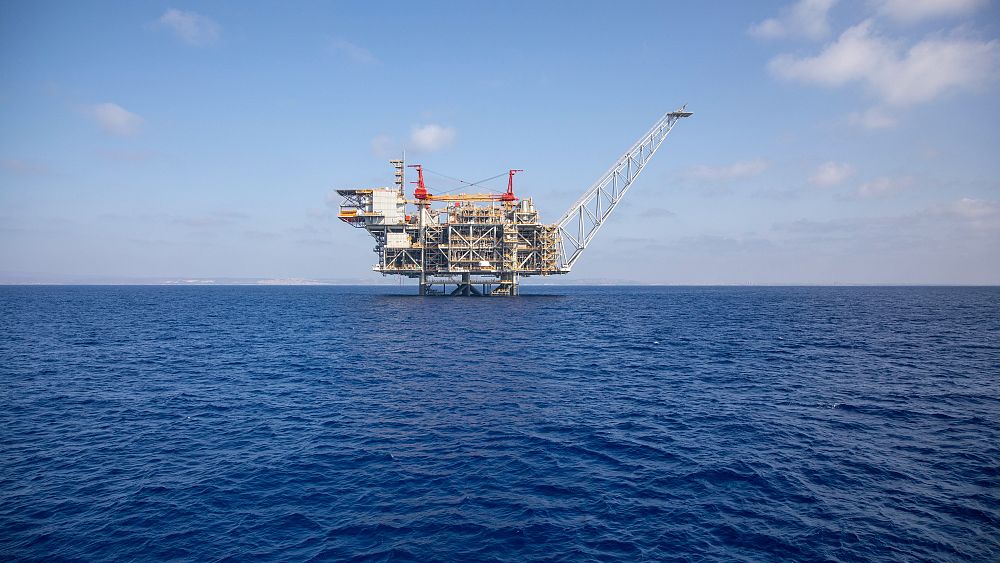Before the Lebanese government accepted a US-brokered deal to resolve a decade-long maritime border dispute with Israel, the mighty Hezbollah had carefully examined the final draft and signaled its acceptance.
To be sure, Iranian-backed Hezbollah, labeled by Washington as a terrorist group and sworn enemy of Israel, was nowhere near the negotiating room during the US shuttle diplomacy that sealed the major deal last week.
But officials familiar with Hezbollah’s thinking, a senior Lebanese official and a Western source familiar with the operation said that behind the scenes the group, which possesses a huge arsenal of weapons, was examining the details and voiced his opinion even as he threatened military action if Lebanon’s interests were not guaranteed.
The maritime delimitation agreement, which the three parties have described as a historic achievement, marks a diplomatic departure from decades of war and hostility and opens the door to offshore energy exploration.
Observers say the deal was more important to Hezbollah’s realism, noting the shift in priorities to a group formed by the Iranian Revolutionary Guard four decades ago to fight Israel. A source familiar with Hezbollah’s thinking told Reuters: “The Hezbollah leadership has checked the agreement line by line before approving it.”
Having spent most of the last decade deploying fighters and military experts across the Middle East to aid Iran’s allies, most notably Syrian President Bashar al-Assad, Hezbollah’s focus today is directly on Lebanon. , a country in deep crisis.
According to Hezbollah, more than ever involved in state affairs, Exploitation of offshore oil and gas It is the only way for Lebanon to come out of the devastating financial meltdown that has hit the entire Lebanese people hard, including its large Shiite audience.
Although Hezbollah has repeatedly stated that it does not fear war with Israel, it says it does not want to go to war with a loyal enemy who invaded Lebanon in 1978 and 1982.
Rebuilding Lebanon took several years due to the last war in 2006. Some Gulf countries helped restore villages and towns that had been completely destroyed, but now these countries are avoiding helping Beirut due to Hezbollah’s influence. . Although Tehran’s support remains strong, Western sanctions have reduced the amount of money Iran can send to Hezbollah.
Ruin or realism
The discovery of energy, while not enough on its own to solve Lebanon’s deep economic problems, would be a huge boon, providing much-needed hard currency and perhaps one day alleviate power outages.
Two Hezbollah lawmakers told Reuters the group was open to the idea of a deal, as a path to alleviating some of Lebanon’s economic woes. “They had to deal with it in a pragmatic, not an ideological way,” said Sami Atallah, founding director of the Lebanese Center for Political Studies, describing Hezbollah’s role as crucial. “They knew they had the power to wreak havoc if they wanted to – but it would come” at a high price “.
The Lebanese official and the Western source familiar with the operation said that Major General Abbas Ibrahim, the Lebanese high security official, who also met with American envoy Amos Hochstein several times, informed the Hezbollah leadership of the American proposals. The Western source said Hezbollah at one point expressed its frustration at the slow pace of talks with Hochstein through Ibrahim.
In response to a question about Hezbollah’s role, the head of the Hezbollah media unit, Muhammad Afif, said the state has started negotiations “and we have been behind”.
Reuters was not immediately able to reach Ibrahim’s office for comment. The State Department did not immediately respond to e-mailed questions about Hochstein’s communications with Ibrahim. A senior US administration official said the negotiations were conducted with Lebanon’s sovereign leadership and did not include talks with Hezbollah.
The urgency of the Hochstein mission increased in June when an Israeli gas drill went out to sea to explore the Karish field, the northern part of which lies in the waters Lebanon claims are in its exclusive economic zone.
On July 2, Hezbollah sent three unarmed drones to the Karish field. The Israeli army intercepted the planes. Hezbollah said it was a show of force and that its allies in Lebanon credited the group’s military stance with obtaining concessions from Israel, a claim that Israel categorically denied. A US official told Reuters that Hezbollah “nearly destroyed the deal with its provocative rhetoric and war-threatening actions … No party can and should not claim victory.”
Peace is still a long way off
Hezbollah has given the green light to controversial details. This included an implicit reference to the agreements that would result in Israel receiving a share of the revenue from the Qana camp, which Lebanon considered entirely in its waters, but of which Israel said it was a part.
Politician Gebran Bassil, who has closely followed the talks, told Reuters that a diplomatic solution would require France’s Total Energy, which is expected to drill on behalf of Lebanon, to conclude a separate agreement with Israel under which it will receive part of the proceeds, bypassing any Lebanese involvement.
A Total Energy spokesperson said they had no comment. Two French diplomatic sources said French officials met with Hezbollah representatives about the global deal. The French foreign ministry said that France actively contributed to the agreement, “above all by transmitting messages between the different parties in coordination with the American mediator”.
Despite the concerted efforts of all sides to reach this agreement, peace remains elusive between the two countries in conflict on many issues and with Hezbollah’s influence deeply entrenched in Beirut.
But more than 16 years after the last war, the benefits gained from any gas production could help avoid war. “Once the pipes reach the water, the war is far away,” said a source familiar with Hezbollah’s thinking.


